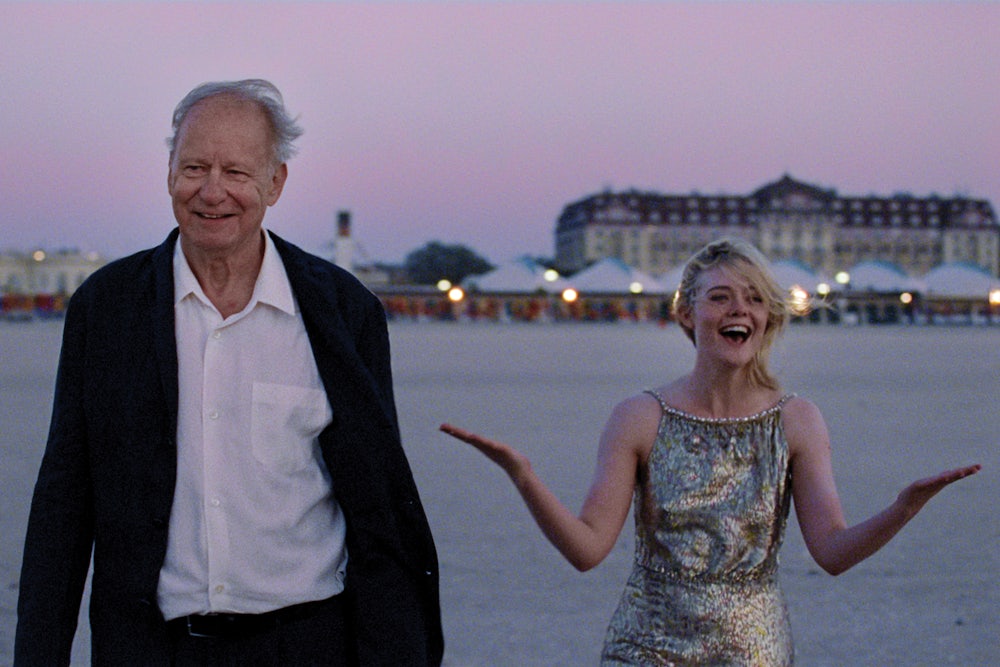Early on in Joachim Trier’s Sentimental Value, a veteran Norwegian film director, Gustav Borg (Stellan Skarsgård), rubs shoulders with Rachel Kemp (Elle Fanning), an American movie star, at a European film festival. He’s in town for a retrospective tribute to his past glories, she for a glitzy red-carpet premiere; they’re both VIPs, and big fans of each other’s work.
Rachel is a celebrity cinephile; she does fashion shoots and perfume commercials, but she’d prefer to accessorize in the Criterion Closet. For her, Gustav represents a living link to an era when Belles du Jour like Catherine Deneuve and Jane Fonda worked regularly with brand-name auteurs; he has the stature to showcase and validate her talent. Rachel’s box-office clout could likewise help Gustav secure funding for his first new project in years, an autobiographical drama inspired by the suicide of his mother, who had been tortured by the Nazis during the German occupation of Norway. Suffice it to say that it sounds like a tough sell.
Gustav and Rachel dine together behind a velvet rope and spend the evening and early morning walking, talking, and frolicking (chastely) on a white-sand beach. As in a fairy tale, a carriage arrives at dawn to take her away. Gustav promises he’ll catch her new movie as soon as possible. Her assistant tells him it opens in the fall.
Sentimental Value is itself the sort of movie that opens in the fall: a veritable autumn sonata for viewers conversant with Ingmar Bergman, those predisposed to giggle at in-jokes about DVDs of The Piano Teacher and the pernicious influence of Netflix. At 51, Trier is a prestige director in ascendance, logged on Letterboxd by Charli XCX (who predicted a “Joachim Trier Summer” back in April at Coachella). At Cannes, where his latest earned a 19-minute standing ovation en route to a Grand Prix, Trier attributed a quote to Buñuel in his acceptance speech: “‘I make films for my friends’… I feel you’re all my friends tonight”—though it’s worth pointing out that when Buñuel unveiled his scabrous surrealist satire Un Chien Andalou in 1929, he came prepared with rocks in his pockets to chuck at the audience in case of a riot.
Trier isn’t the sort of filmmaker who gets attacked at his premieres. He’s there to make friends, and his success over the past few years suggests he’s good at it. His skillful, literate movies tick a lot of upper-middle-brow boxes. Reprise (2006) was a witty, observant comedy about a pride of wannabe–literary lions stalking through Oslo. The film’s portrait-of-the-artist storyline seemed to track its maker’s own upwardly mobile ambitions: “It’s only a matter of time,” critic Michael Koresky prophesied, “before Hollywood gets its hands on him and turns him into an anonymous hack.” The English-language dialogue and A-list cast of 2015’s Louder Than Bombs—starring Gabriel Byrne, Jesse Eisenberg, and Isabelle Huppert—seemed to justify such ominous portent, as did the slick but undistinguished elevated-horror shtick of Thelma (2017).
But 2021’s The Worst Person in the World, starring Trier’s countrywoman Renate Reinsve as a self-deprecating millennial dilettante, generated an inverse gravitational pull. Instead of selling out, Trier doubled down on a particular strain of Scandinavian specificity; the film’s vision of Oslo as a cosmopolitan minefield of professional and romantic peril channeled something potent and strangely aspirational in a pent-up global zeitgeist. The image of Reinsve’s character jogging blithely through a city otherwise frozen in suspended animation around her conjured up a vivid and crucially Covid-coded solipsism, the triumphant loneliness of the long-distance runner. She’s migrating from one lover to another, in thrall to potentially self-destructive impulses. The question hovering over Sentimental Value, with its multiplex-meets-art house plot points and subtexts, is whether Trier is trying to change his creative trajectory—crossing over fully into lucrative transnational territory—or staying in his lane as a European director fascinated by (but not subservient to) the lure of the U.S. industry.
Reinsve won the Cannes best actress prize for The Worst Person in the World, and she returns in Sentimental Value as Nora—an actress who might be award-worthy if only she could find the guts to walk out onstage. The first time we see her, she’s hyperventilating and literally rending her garments backstage on the opening night of a new avant-garde production. She says she’ll only go on if somebody slaps her or fucks her first (she isn’t picky); the company takes her tantrum in stride, as the cost of doing business with a genius. The myriad hang-ups and anxieties of the thespian class are well-trod territory, but Trier is a clever filmmaker; his editing choices here underline the idea that Nora’s bout of stage fright is its own form of tour de force. He cuts away the moment she finally hits her mark onstage. We’ve already seen the performance that matters.
Nora is 80 percent fucked up, she tells her lover later on, with what seems like a well-rehearsed mix of shame and pride. She comes by her neurosis honestly, because she is Gustav Borg’s eldest daughter—a nepo-baby whose paralyzing ambivalence toward her craft is tied up in her starry birthright. As children, Nora and her little sister, Agnes, watched and listened, avid and helpless, through the vents and walls of their sprawling, dragestil family home as Dad rationalized his recurring absences—and attendant bouts of infidelity—as by-products of the art life.
The pièce de résistance among Gustav’s myriad acts of emotional manipulation was enlisting Agnes, then not yet even a teenager, to star in one of his most famous movies—a wartime drama about an orphan on the run. By holding his younger daughter so close, he made it that much worse when, inevitably, he left for good. In the aftermath, Nora was left to care for Agnes and their ailing mother, Sissel; the latter’s death after a long and painful illness catalyzes the movie’s plot. Looking hale and hearty, and carrying his latest screenplay in hand in lieu of flowers, Gustav shows up for Sissel’s funeral and gets down to business. He offers Nora the lead role in the movie, claiming that he wrote it specifically for her: an offer she can’t refuse. Beyond the fuzzy math of trying to substitute his estranged daughter for his sainted mother—a part that will oblige her to pantomime hanging herself on-screen—Gustav is giving Nora his version of the high-hat. Over lunch, he claims that the movie will give Nora a chance to prove her chops beyond the stage and television roles that he considers to be beneath her—and, by extension, beneath him as well.
If Nora was four-fifths fucked up already, Gustav’s proposal sends her spiraling toward the 100 percent mark. And that’s before Rachel Kemp shows up in Oslo looking distinctly like her doppelgänger, with her blonde hair dyed brown and a dodgy Norwegian accent. Gustav’s Plan B, it seems, is to forge ahead without niceties or permission; as ever, the movie is the only thing that matters. Besides driving Nora into hiding, Gustav’s production effectively displaces Agnes (Inga Ibsdotter Lilleaas) and her husband and son from their home, which Gustav still owns. He then pulls the puppet strings even tighter by offering Agnes’s son a role, effectively instrumentalizing the impressionable kid as a flesh-and-blood prop-slash-collateral—the mirror image of his transgression a generation ago.
The question of whether Gustav is an emotional terrorist, a control freak, or simply a spectacular asshole—and whether those qualities are necessarily commensurate with being a successful filmmaker—is at the heart of Sentimental Value, which gets considerable mileage out of Skarsgård’s status as probably the most decorated Scandinavian actor since Max von Sydow. His credits working for the mercurial likes of Lars von Trier and Bergman—whom the actor derided as “manipulative” during the movie’s press tour—serve elegantly as shorthand for the idea of the director as a sacred monster, and Skarsgård gives a marvelously jagged, high-comic performance, all good spirits and bad vibes. Gustav carries himself in expectation of a hero’s welcome at all times, and fairly exhales self-regard, as if high on his own supply of rarefied air; he’s the sort of person who enters a room and gangs up on its inhabitants all by himself.
The other members of the ensemble pull their weight: Reinsve’s congenital flintiness is well-suited to a character who’s spent most of her life cultivating defense mechanisms (the flip side to her reckless exhibitionism), while Fanning is a good actress who’s nevertheless treading water out of her depth. (The sequence where Gustav gaslights Rachel into believing she’s rehearsing with the actual chair that his mother used in her suicide is grimly funny.) It’s clear that Trier loves actors, as fictional characters as well as collaborators, and he and co-writer Eskil Vogt work to generate a series of sly, self-reflexive variations around the idea of performance—scenes that would be startling if they weren’t derivative of recent-ish hall-of-mirrors movies by Mia Hansen-Løve and Olivier Assayas.
Looming especially large in the rearview is Assayas’s fine 2014 drama, Clouds of Sils Maria, another Bergman-inflected confection limning the give-and-take relationship between Eurocentric art cinema and Hollywood product. The broad strokes of Fanning’s character are so close to Chloë Grace Moretz’s clout-chasing starlet in Clouds that the subplot feels almost unseemly, like a steal. The difference is that where Assayas uses his illusions and allusions weightlessly, Trier’s dramaturgy is heavier. Roger Ebert once wrote that movies were a machine for generating empathy, and Sentimental Value resembles that remark to a fault; it’s a steely contraption with a human face, like a Terminator programmed not to kill, but to compel heart-in-throat catharsis at regular intervals. In an attempt to do right by his characters—every participant’s motives are scrutinized and absolved in short order—Trier locks the material into a set of redemptive trajectories, sacrificing spontaneity for shapeliness; amends are made, motivations are clarified, thorns are removed from sides.
The piercing truth of Sentimental Value’s best scene—an exchange between Nora and Agnes suffused with real, lived-in understanding of the toll it takes to be somebody else’s rock—shows up the methodical patness of much of the rest of it. It also throws into even starker relief Trier’s flaws of overreaching. An abstract interlude where the main character’s faces are morphed together in an odd, quasi-psychedelic gloss on Bergman’s Persona stands out first for its forced aestheticism; meanwhile, the film’s attempts to integrate a serious meditation on Norway’s wartime trauma stretch the material gossamer thin.
Sentimental Value concludes with a gesture of reconciliation rendered just ambiguous enough for the purposes of chin-stroking: a moment where the fourth wall, already wobbly, recedes and is viewed from a distance. All the world’s a soundstage, after all, and Trier’s ability to render this truism as something more than a cliché speaks to his talent; that it’s also less than a revelation maps his limitations. Somewhere in between Trier’s prodigious reach and dexterous grasp lies the sort of masterpiece that’s uninterested in standing ovations. Maybe next fall.




